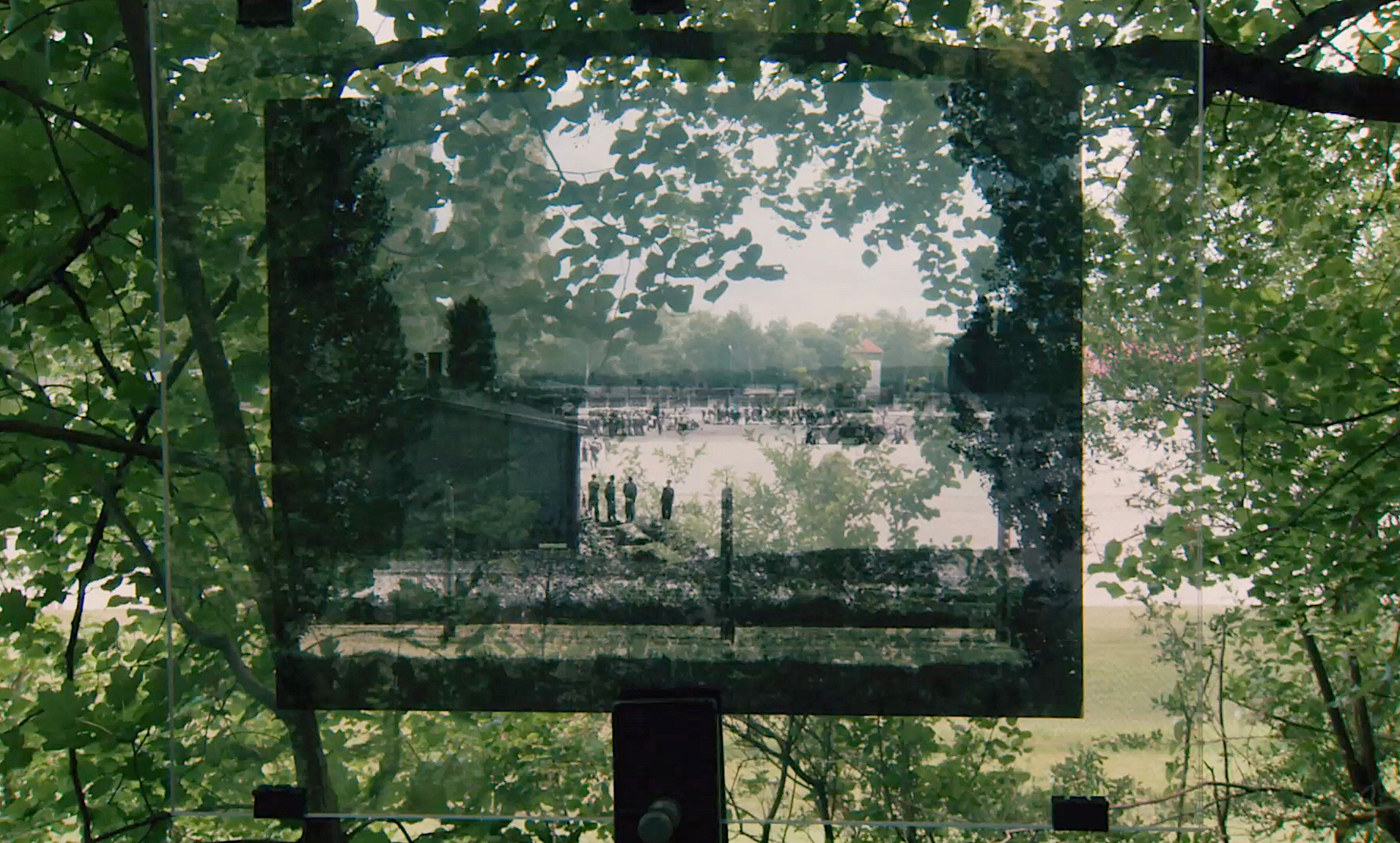Memorable images, moments, qualities, techniques and scenes from the experimental offers across Berlinale 2021’s Forum, Encounters and Shorts programmes
From Where They Stood (Christophe Cognet, 2021)
When Daniel Kasman covered the Locarno Festival on Notebook in 2017 he hit upon a great way of engaging with standout work. In his introduction, he explained that he would be “looking for specific images, moments, techniques, qualities or scenes…that grabbed me and have lingered past and beyond the next movie seen, whose characters, story and images have already begun to overwrite those that came just before.” This seemed like a great way to engage with the creative work in a milieu like a festival - to concentrate on that which lingers rather than attempting to highlight everything. As such, we’ve shamelessly pilfered this very technique for the ALT/KINO festival reports.
In this instance, Patrick Gamble went in search of memorable moments and motifs in amongst the panoply of great work screening as part of the 2021 online edition of Berlinale.
Rock Bottom Riser (Fern Silva, 2021)
The revolutionary lyrics of Simon & Garfunkel in Fern Silva’s Rock Bottom Riser
Combining geology and ethnography to create a powerful argument for the decolonisation of astronomy, Fern Silva’s feature-length debut frames the Hawaiian volcano of Mauna Kea as a site of resistance. The mountain is considered sacred by many of the island’s indigenous population, and the proposed construction of an enormous observatory known as the Thirty Meter Telescope has led to numerous high profile demonstrations. Through a series of time-lapse shots of lava erupting from the earth’s core, Silva provides a visual metaphor for the environmental impact of space exploration, but for those who require a more didactic approach, he gatecrashes a classroom in which students discuss the “poetry” of Simon and Garfunkel’s I Am a Rock. Silva observes the group as they ruminate on the meaning of Paul Simon’s figurative lyrics as if through a telescope. However, instead of finding answers to cosmic questions, he discovers an inhospitable terrain with limited signs of intelligent life.
A River Runs, Turns, Erases, Replaces (Zhu Shengze, 2021)
The lost art of letter writing in Zhu Shengze’s A River Runs, Turns, Erases, Replaces
Created using footage recorded during visits to her home town of Wuhan prior to the coronavirus outbreak in January 2020, Zhu Shengze’s latest film is a city-symphony orchestrated around a vivid sense of loss. Wuhan is often called “Jiang Cheng” (River City), due to its proximity to the Yangtze, and Zhu uses the river as a focal point to express how the intersection of memory, trauma and economic growth has shaped the city. Through a series of static, long-duration shots - often of roaring machines and rising infrastructure - she depicts a mercurial and ever-changing landscape. These images are occasionally interrupted by on-screen letters written by locals who lost loved ones during the pandemic. Conjuring painful images out of plaintive language, these correspondences allude to something intangible and enormous outside the frame. ‘We couldn’t be with you when you needed us most,’ writes a daughter to her father. Later a young boy explains how his heart ‘shattered to a thousand pieces’ when he heard his grandmother had died. In a city built on the notion of progress, people are often discouraged from dwelling on the past, but through these letters, the film creates an oral history of the pandemic that even the river can't erase.
One Thousand and one Attempts to be an Ocean (Wang Yuyan, 2021)
Surfing the web just got a lot harder; Wang Yuyan’s One Thousand and one Attempts to be an Ocean
We’re told that choice is good for us, that it instils us with freedom, autonomy and a wealth of possibilities, but anyone who's spent the best part of an evening scrolling through Netflix will tell you this is empirically not true; our brains are busier than ever before and trying to figure out what we want can be exhausting. In her latest work, Wang Yuyan responds to this sensory overload by bursting the digital dam of content and unleashing a tsunami of what she refers to as "satisfying videos" from the internet. Soundtracked by a looped beat and repetitive, yet incomprehensible voice (are they saying ‘party tonight?’ or ‘Hunt you tonight?’), images created using underwater cameras, and viral footage of watery mishaps hit the audience at a prodigious rate. Demanding a capacity for looking at the entropy of contemporary life without flinching, this heady exercise in nausea-inducing fantasia is both hallucinatory and discombobulating, with Wang suggesting we need to learn how to swim in this digital ocean or risk sinking to the bottom.
The Inheritance (Ephraim Asili, 2020)
“We are a shoeless house” Ephraim Asili’s The Inheritance
Towards the end of Asili’s impressive debut feature - a dramatic retelling of the director’s own experience of living in a Black radical collective - a group of housemates sit around a table and attempt to agree on a range of topics. Discussions range from which room should house the group’s ‘revolutionary people’s reading room’ to who they should invite to be the keynote speaker at their next event. However, there’s one agenda item that sparks the biggest debate, whether or not the house should be shoeless. Experiments in living communally inevitably involve some form of disagreement, but it’s often petty arguments and domestic acts of microaggression that threaten to topple these utopias. However, by weaving together his own experiences with archive footage of the West Philadelphia–based MOVE Organization and the playful didacticism of Jean-Luc Godard’s La Chinoise, Asili lays down the blueprint for a community space in which solidarity and camaraderie could flourish.
The Coast (Sohrab Hura, 2020)
Systemic violence can be a tough nut to crack in Sohrab Hura’s The Coast
The latest chapter in his The Lost Head and the Bird project, Sohrab Hura’s The Coast explores the undercurrents of violence in contemporary India by observing the Dasara festival in Tamil Nadu. Slow-motion shots of people swimming in the sea at night are juxtaposed with scenes of local rituals like a man smashing a coconut open with his head. It’s believed this tradition originated in the area during British rule when a group of locals asked their colonial oppressors to change the course of a railway track that threatened to destroy their village. The British soldiers agreed, but on one condition; they broke a coconut with their heads. The coast has often been used as a point of meeting between worlds, in which the raw elemental power of nature collides with urban life, but Hura seems to be suggesting that India is caught somewhere in the middle. As men and women struggle to stand amongst the waves, we see a nation trapped between the colonial violence of the past and the aggressive political landscape of Narendra Modi’s India.
Tzarevna Scaling (Uldus Bakhtiozina, 2020)
The morphology of fairy tales in Uldus Bakhtiozina Tzarevna Scaling
A feminist spoof of costume dramas and the cinderella narrative, Uldus Bakhtiozina’s Tzarevna Scaling takes the viewer on a delightfully weird journey through Russian culture. The film follows a fish van attendant named Polina (Alina Korol) who, after drinking a herbal tea given to her by one of her customers, finds herself embarking on a dreamlike journey into the world of Tzarevens, the female princesses of Russian folk tales. Guided by a walkie-talkie-wielding fairy-godmother, Polina attempts to find her “plot line” on a mission that sees her encounter everything from men in goat costumes dancing to Belarusian rap music to women with swans on their head arm wrestling by a swimming pool. Bakhtiozina draws upon an abundance of mythological and historical figures and symbols in her structural analyses of folklore. From frog princes and poisonous apples to Soviet interiors and contemporary pop music, she explores how the meaning behind traditional folk tales continues to shape Russian culture and perpetuate patriarchal ideologies of gender and beauty.
Moon, 66 Questions (Jacqueline Lentzou, 2021)
The emotional impact of parentification in Jacqueline Lentzou’s Moon, 66 Questions
There are plenty of memorable moments in Jacqueline Lentzou’s feature-length debut; from the car wash sequence where Artemis (Sofia Kokkali) finds catharsis in the beat of Bomfunk MC’s Freestyler, to the interplanetary dialogue that occurs after she discovers a life-changing piece of information. Described as a film about ‘flow, movement and love,’ it’s the role acting plays in Artemis’ attempts to better understand her father following a debilitating stroke that resonates the strongest. Treading a fine line between comedy and tragedy, she tries to light a cigarette with the clenched hands of a stroke sufferer, and even crawls across the floor using just her elbows, but it's the reenactment of a historic argument that signals a turning point in their relationship. Wearing her father’s glasses, and mimicking his voice, she recreates the conversation they had when she was a teenager and her father refused to let her attend a friend’s sleepover. What at first looks like a regression into teenage insubordination reveals itself to be an attempt by Artemis to foster empathy for her father, with the scene triggering a low-key body-swap that intelligently signals the reversal of their parent-child dynamic
The 71st Berlinale ran from 1 - 5 March and 9-20 June 2021
Patrick Gamble is a writer on film and culture, whose work has featured on Hyperallergic, BFI, Calvert Journal and Kinoscope. Further links to his writing can be found at patrickgamble.contently.com.








